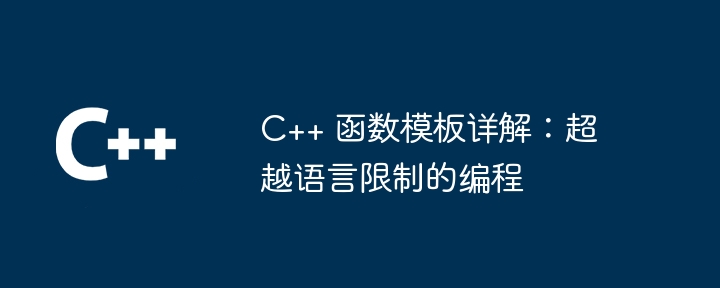
Function templates are a powerful feature of C that can create reusable code for multiple data types: Syntax: template <class T> specifies the template type parameter T. Practical case: The max function template returns the larger of two values and is suitable for a variety of data types. Advantages: Code reuse, scalability, flexibility and maintainability.

Function templates are a powerful feature in C. Allows you to write reusable code that works with a variety of data types. By using function templates, you avoid writing duplicate code for different data types and make your code more flexible and maintainable.
The syntax of the function template is as follows:
template <class T>
T myFunction(const T& x, const T& y) {
// 函数体
}Where:
<class T>: Template A type parameter that specifies any type of placeholder that can be passed in the function template. myFunction: Function name. x and y: function parameters, which can be any value of type T. T&: Passing by reference can improve function efficiency. Let us understand the usage of function templates through a practical case. We write a function template named max, which can return the maximum of two values:
template <class T>
T max(const T& x, const T& y) {
if (x > y) {
return x;
} else {
return y;
}
}We can use this function template to find the maximum value of various data types, such as :
int a = 5, b = 10; std::cout << "最大整数:" << max(a, b) << std::endl; double x = 2.5, y = 3.1; std::cout << "最大浮点数:" << max(x, y) << std::endl; std::string str1 = "Apple", str2 = "Orange"; std::cout << "最大字符串:" << max(str1, str2) << std::endl;
Function templates have the following advantages:
Function templates are a powerful feature in C that allow you to write reusable code across different data types. By understanding the syntax and advantages of function templates, you can create scalable and maintainable C code.
The above is the detailed content of Detailed explanation of C++ function templates: Programming beyond language limitations. For more information, please follow other related articles on the PHP Chinese website!
 What are the differences between c++ and c language
What are the differences between c++ and c language
 Recommended learning order for c++ and python
Recommended learning order for c++ and python
 Cost-effectiveness analysis of learning python and c++
Cost-effectiveness analysis of learning python and c++
 Is c language the same as c++?
Is c language the same as c++?
 Which is better to learn first, c language or c++?
Which is better to learn first, c language or c++?
 The difference and connection between c language and c++
The difference and connection between c language and c++
 C++ software Chinese change tutorial
C++ software Chinese change tutorial
 Cost-effectiveness analysis of learning python, java and c++
Cost-effectiveness analysis of learning python, java and c++




